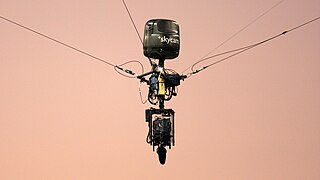
Cascade Parent Limited, doing business as Alludo, is a Canadian software company headquartered in Ottawa, Ontario, specializing in graphics processing. Formerly called the Corel Corporation, the company is known for producing software titles such as CorelDRAW, and for acquiring AfterShot Pro, PaintShop Pro, Painter, Video Studio and WordPerfect.
NewTek, Inc., is a San Antonio, Texas–based hardware and software company that produces live and post-production video tools and visual imaging software for personal computers. The company was founded in 1985 in Topeka, Kansas, United States, by Tim Jenison and Paul Montgomery. On April 1, 2019, it was announced that NewTek would be acquired by Vizrt.

The Quantel Paintbox was a dedicated computer graphics workstation for composition of broadcast television video and graphics. Produced by the British production equipment manufacturer Quantel, its design emphasized the studio workflow efficiency required for live news production.
Vantiva SA, formerly Technicolor SA, Thomson SARL, and Thomson Multimedia, is a French multinational corporation that provides creative services and technology products for the communication, media and entertainment industries. Vantiva's headquarters are located in Paris, France. Other main office locations include Norcross (USA), Rennes (France) Edegem (Belgium) Seoul, Beijing (China), Chennai (India), Memphis (USA).
Quantum Corporation is a data storage, management, and protection company that provides technology to store, manage, archive, and protect video and unstructured data throughout the data lifecycle. Their products are used by enterprises, media and entertainment companies, government agencies, big data companies, and life science organizations. Quantum is headquartered in San Jose, California and has offices around the world, supporting customers globally in addition to working with a network of distributors, VARs, DMRs, OEMs and other suppliers.
Grass Valley is a manufacturer of television production and broadcasting equipment. Headquartered in Montreal, Quebec, it was formed by the March 2014 merger of the original Grass Valley with Miranda Technologies, which were both acquired by American networking company Belden in 2014 and 2012, respectively. In February 2018, owners Belden merged Grass Valley with newly-acquired Snell Advanced Media. On July 2, 2020, Grass Valley announced the completion of its acquisition by private equity firm Black Dragon Capital from Belden Inc.

Vizrt, short for Visualization in Real-Time or Visual Artist, is a Norwegian company that creates content production, management, and distribution tools for the digital media industry. It's products includes applications that create real-time 3D graphics and maps, visualised sports analysis, media asset management, and single workflow solutions for the digital broadcast industry.
Cirrus Logic Inc. is an American fabless semiconductor supplier that specializes in analog, mixed-signal, and audio DSP integrated circuits (ICs). Since 1998, the company's headquarters have been in Austin, Texas.

Eizo Corporation is a Japanese visual technology company, founded in March 1968, which manufactures display products and other solutions for markets such as business, healthcare, graphics, air traffic control, and maritime. The company is headquartered in Hakusan, Ishikawa Prefecture.
Norpak Corporation was a company headquartered in Kanata, Ontario, Canada, that specialized in the development of systems for television-based data transmission. In 2010, it was acquired by Ross Video Ltd. of Iroquois and Ottawa, Ontario.

Skycam is a computer-controlled, stabilized, cable-suspended camera system. The system is maneuvered through three dimensions in the open space over a playing area of a stadium or arena by computer-controlled cable-drive system. It is responsible for bringing video game–like camera angles to television sports coverage. The camera package weighs less than 14 kilograms (31 lb) and can travel at 13 m/s (29 mph).
TVU Networks Corporation is a privately held technology company based in Mountain View, California.
The Chyron Corporation, formerly ChyronHego Corporation, headquartered in Melville, New York, is a company that specializes in broadcast graphics creation, playout, and real-time data visualization for live television, news, weather, and sports production. Chyron's graphics offerings include hosted services for graphics creation and order management, on-air graphics systems, channel branding, weather graphics, graphics asset management, clip servers, social media and second screen applications, touchscreen graphics, telestration, virtual graphics, and player tracking.
Calian Group Ltd. is a Canadian company that was founded in 1982 as an Ottawa-based consulting firm. The company went public in 1993 and is traded on the Toronto Stock Exchange (TSX) under the symbol CGY.
ATSC 3.0 is a major version of the ATSC standards for television broadcasting created by the Advanced Television Systems Committee (ATSC).
Founded in 2002, Optelian Access Networks Corporation (Optelian) is a privately owned and operated Intuitive Packet Optical Networking company. Optelian has two headquarters – one in Ottawa, Ontario (Canada) and the other in Marietta, Georgia (U.S.). The company has both product development and local manufacturing based in Ottawa. Initially producing passive networking components, Optelian has added active products for service providers, wireless applications, utilities, research and education, cloud and data center, or any other enterprise.
Halogen Software was a Canadian company that provided cloud-based talent management solutions to customers with between 100 and 10,000 employees. The firm was founded in 1996 and was headquartered in Ottawa, Ontario, Canada.
Synamedia Ltd. is a video technology provider headquartered in Staines-upon-Thames, UK. Its products cover content distribution and delivery, video processing, advanced advertising, broadband offerings, and video security.

A cable-suspended camera system is a system of cables above or along an area to be filmed or videoed, over or along which an attached camera head travels to achieve required camera angles.
Channel in a box is the name given to an all-in-one playout device for broadcast television. Commonly based on a standard PC, it includes the ability to store content immediately required, add graphics, and deliver it to a transmission chain. Thus it provides an integrated, software playout platform.







